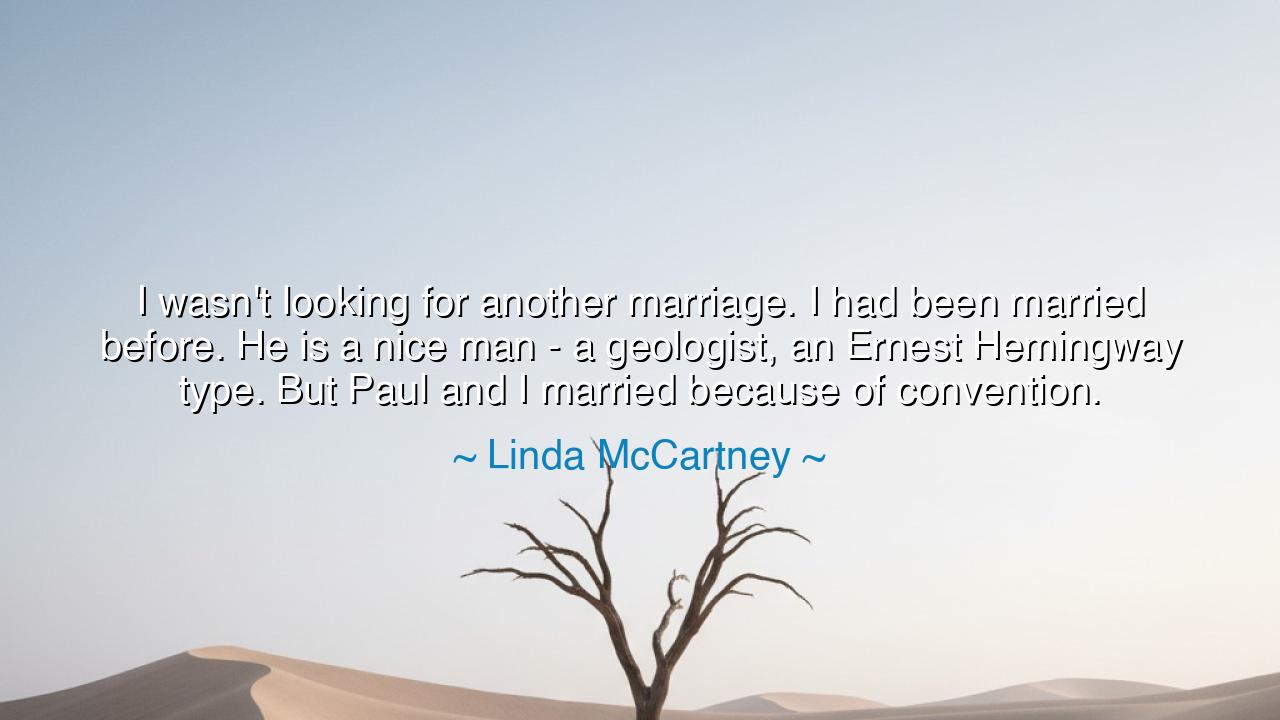
I wasn't looking for another marriage. I had been married before.
I wasn't looking for another marriage. I had been married before. He is a nice man - a geologist, an Ernest Hemingway type. But Paul and I married because of convention.






Hear, O seekers of truth, the words of Linda McCartney, a woman whose life was bound to art, to music, and to love: “I wasn't looking for another marriage. I had been married before. He is a nice man—a geologist, an Ernest Hemingway type. But Paul and I married because of convention.” In these words lies a quiet revelation of the tension between desire and duty, between the call of the heart and the weight of society’s expectations. For here she confesses that her union with Paul, though filled with affection, was shaped not only by passion but by the pull of convention—that invisible law that presses men and women into roles they may not have chosen freely.
The meaning of her words is deep. Marriage, she admits, was not her longing after having already walked that road once before. She knew its struggles, its entanglements, and she did not seek to bind herself again. Yet when Paul entered her life, love unfolded not in the shape of rebellion but within the boundaries society demanded. “Because of convention,” she says, as if to suggest that love itself was not enough without the sanction of ritual, without the seal that the world expects upon union. Her honesty pierces through the veil of romance: not every marriage is born purely of desire, some are born because tradition demands it.
The origin of this truth lies in the history of women, who for centuries have been bound by custom to marry, often regardless of their own wishes. Society, like an unyielding shepherd, guided them into marriage as the “proper” fulfillment of life, whether their hearts longed for freedom or solitude. Linda’s words echo the voices of countless women who have entered marriage not out of longing but out of expectation—a reminder that even in modern times, the weight of tradition shapes choices as much as personal desire.
History offers us many such tales. Consider the story of Eleanor of Aquitaine, one of the most powerful women of medieval Europe. Twice married, first to Louis of France and then to Henry of England, her unions were not driven by love but by politics and convention. And yet, within those bonds, she carved out her own legacy of influence, becoming a patron of culture and a force in governance. Her marriages were shaped by convention, but her spirit rose beyond convention’s chains. Like Linda McCartney’s confession, Eleanor’s story reminds us that the form of marriage may be shaped by duty, but the soul within it still longs for authenticity.
Linda’s words also contain a note of tenderness. She calls her first husband “a nice man, an Ernest Hemingway type.” In this, she does not speak with bitterness but with respect. Yet the contrast is clear: nice men and deep bonds are not always the same. Affection, respect, and admiration are not always enough to sustain love’s eternal fire, especially when they are shaped by convention more than by destiny. Thus, her words are tinged with both gratitude and resignation, as though acknowledging the good but also the limits of what was.
The lesson is sharp and enduring: do not let convention alone dictate the choices of your heart. While society may honor marriage as a noble institution, its value lies not in fulfilling expectation but in the authenticity of the love it protects. To marry only for convention is to risk building a house upon sand, a structure outwardly proper yet inwardly fragile. True marriage demands freedom of choice, not the weight of obligation alone.
So, children of tomorrow, carry this teaching: let your unions be born of sincerity, not merely of convention. Honor tradition, but do not let it smother your truth. Love is not made stronger by the world’s approval, but by the shared devotion of two souls who choose one another freely. If you marry, let it be not because society demands it, but because your heart burns with conviction. For only then will marriage be not the yoke of convention, but the covenant of love, enduring as long as the stars.






AAdministratorAdministrator
Welcome, honored guests. Please leave a comment, we will respond soon